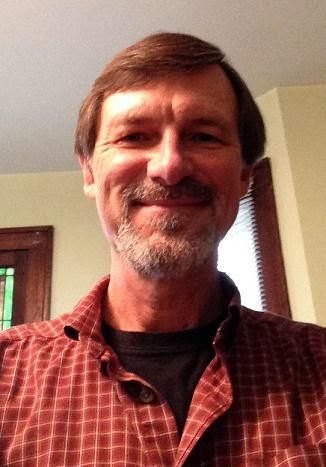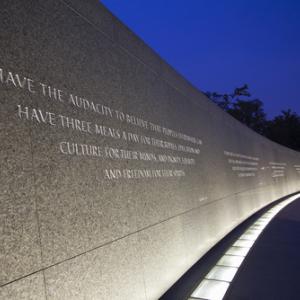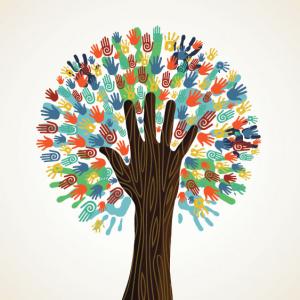
Joe Kay is the associate minister at Nexus United Church of Christ, Butler County, Ohio. He also writes a weekly blog at https://joekay617.wordpress.com. His email address is listed on the blog, in case you care to contact him directly.
Posts By This Author
Be a Light
Light is important to us. Those of us who live in the Midwest are reminded of how much we need it during this time of year. The sun sets early. On so many days, our sunlight is tinged with gray as it seeps through the clouds.
Light seems to be in short supply.
All of the festive holiday Christmas lights have been put away, leaving the darkness unchecked. We recently had religious celebrations that involved lighting candles on our menorahs, on our advent wreaths and our dinner tables. Many people celebrated the birth of a Jewish rabbi who urges everyone to be a light to the world.
Don’t wait for someone else to bring the light. Be the light.
Prophets, Questions, and a Dream
Prophets are always asking questions. Tough questions. Unsettling questions. Questions that they pose to themselves, then try to answer by how they live.
Questions such as:
What’s in our hearts? Are we concerned too much about ourselves and too little about others? Do we believe in love? Why do we give in so readily to bitterness and hatred?
Why do so few have so much, while so many have so little? Aren’t we all diminished by the poverty, discrimination, violence, and the various injustices in our world? Why do we glamorize violence and weapons as solutions to our problems?
A Gift of Hot Chocolate
My mom died in a nursing home five years ago this week. She spent the last 10 months of her life there following a severe stroke. Mary was buried next to her mom, Ann, at the top of a gently rising hill in a cemetery during a 13-inch snowfall in Cleveland.
There was a lot of talk about hot chocolate that day.
My mom always found ways to give something to others. Multiple sclerosis forced her to use a wheelchair, but she still figured out ways to give gifts. She took a ceramics class in her apartment building and made Christmas ornaments for family and friends. Some of them hang on our tree even now. A red-nosed reindeer that she made stands in our living room each December.
After her stroke, she was very limited. One side of her body didn’t work at all. She was bedridden those last 10 months. Still, she found a way to give. When the attendants at her nursing home came around and asked what she wanted for each meal, she ordered a packet of hot chocolate with it.
She didn’t like hot chocolate. Never drank it. But she saw an opportunity to come up with a gift. She saved the packets of hot chocolate and gave them to my sister Joanne, who has two boys. They would get the gift of hot chocolate from her.
What a remarkable gesture, eh? Even confined to a bed, she found a way to give.
Who Are We to Judge?
One of my favorite quotes of 2013 comes from Pope Francis. Asked what he would say about a member of the Catholic clergy who is gay, he responded with a question of his own.
“Who am I to judge?” Francis replied.
A good question for all of us, no?
Our world is inundated with judgment. Social media can be a swamp of it. Recently, a television celebrity was judgmental about those who are different from him and got in trouble for it. Many defended his judgmental attitude and words.
Which raises some important questions for all of us: Is it good to be judgmental? Isn’t life about making judgment calls and living by our values? Aren’t we all judgmental in some ways?
We all make judgments every day, decisions about what we think is best to do in the various circumstances of our lives. We might see someone in need and decide to help. We might recognize one of our shortcomings and decide we’ll change. We might run into an unforeseen challenge and try to figure out the best way to respond.
That’s all well and good.
Being judgmental is a very different thing.
Give Like God -- or More Like Santa?
Have you ever given someone a gift knowing that person probably wasn’t going to keep it? You had no idea what to give, so you gave something — a sweater, let’s say, even though you knew the recipient had more than enough sweaters — along with a gift return receipt.
That’s kind of how God gives, isn’t it? No, no, not the sweater part. The part about giving and then letting the others choose what they’ll do with the gifts.
Isn’t that how God gives to us?
And if we’re to be like God, shouldn’t we be giving the same way?
This is a challenging question, but one that’s relevant at this season of giving. Do we give with no strings attached? Or do we give with conditions? Do we give only to those we deem worthy?
Is Love All We Need?
The Beatles first performed “All You Need Is Love” in 1967 as part of an “Our World” global television link, the first of its kind. The song was perfect for the occasion and became a hit. It’s got a catchy lyric and the chorus makes for an interesting debate even today.
Is it true that all we really need is love?
Many of us don’t feel that way. Many of us have a lot of other things filling our lists of what we need and value the most: self-sufficiency, independence, money, privilege, career advancement, our country, our family, our religion.
Many religions don’t see it that way, either. They dote on theological constructs and codes of conduct for their followers. They devise lists of who’s in God’s favor and who is not. Their do-and-don’t lists rarely say much about love and its ramifications.
They love rules instead.
Removing Our Hats -- And Changing Everything
Desmond Tutu tells a story of when he was nine or 10 years old and he stood with his mother outside a building where she worked as a cook. This was 1940s apartheid South Africa, where black people were considered inferior in all respects. A lanky, white Anglican priest named Trevor Huddleston walked by in a long cassock, saw his mother, and doffed his hat to her.
The white man would have been expected to ignore the black woman, who amounted to nothing in her society. With one simple gesture, he went out of his way to tell her that her society had it all wrong and that she was equally valued and loved.
That moment made a profound impression upon Tutu, who wrote about it in his book, Made For Goodness.
What seem like very small, ordinary acts often have immense and lasting impacts. And every interaction that we have — even with a stranger on the street — can leave some sort of mark, either helpful or hurtful.
What Are We Waiting For?
Much of our imagery of Advent is tied into the idea of waiting. Waiting for Emmanuel to come. Waiting for God to intervene. We’re in the middle of the night waiting for dawn to arrive. We’re waiting for something different to happen. One image is the pregnant woman waiting to give birth, which ties into the nativity story.
We spend a lot of our lives waiting for various things. Maybe the question for Advent is: What are we waiting for? And when does the waiting end?
So much of our religion has become about waiting. Waiting for heaven. Waiting for God to respond to a prayer and to change something. Waiting for God to right the wrongs. Waiting for God to set things straight. Waiting and waiting and waiting.
What if we’ve got it backward? What if someone is waiting for us?
Thanksgiving? Bah, humbug
Scrooge is convinced that he has earned all that he has. His pile of money? It’s all that matters to him, and he believes that he built it all by himself. There’s no reason to show gratitude to anyone else.
Be thankful? Bah, humbug.
Could that be one of the reasons we’ve turned Thanksgiving into just another shopping day? We don’t recognize the gifts, so we don’t recognize the giver.
Diversity Within the Divine
What would the world be like if we were all more alike?
This isn’t just a philosophical question. In many ways, we live as though we wished others were more like us. We spend time with those who are similar to us and avoid those who seem to be different. We enjoy being around those who share our viewpoint and avoid those who challenge it. We accept the parts of others that make us comfortable and ignore or reject the rest.
But what about our diversity? Do we embrace it, or do we merely tolerate it?
Over time, I’ve grown to appreciate the importance of our differentness. I’ve gotten to the point where I think of this incredible diversity — within our universe, within our human family — as one of our greatest blessings.
Rewriting the Lord's Prayer: What If How We Prayed Matched How We Live?
After reciting what we call the Lord’s prayer one Sunday, I got to thinking about how many times I’d said those words. Thousands? But how many times have I actually thought about what the words mean?
If we pay attention, it’s a prayer that makes us very uncomfortable.* These words of a peasant Jewish rabbi from 2,000 years ago challenge so much about the way we live — all of us, regardless of what religion we follow. If we’re honest, most of us don’t like it and have no intention of living by what it says.
Which presents a question: Isn’t it a problem if we pray one way and live another? Shouldn’t our prayers reflect how we actually try to live?
Along those lines, perhaps we should rewrite the Lord’s prayer and make it conform to what we really believe. In that spirit, here’s a rough draft of what it might sound like if the Lord‘s prayer was actually our prayer.
Letting Go ...
I realized that other parents are hoping that I will love and care for their children just as they do. There are so many moments every day when someone else’s child is in my hands. Do I recognize this? Do I choose to see them and love them that way?
In reality, our hands are never empty, even when it feels like we’re letting go of someone so special to us. We open our hands and give our children as a gift to the world. And in the same moment, we find our hands filling up with so many others — the children of others, the parents of others, the brothers and sisters of others.
Will we treat them with the same love and care that we give to our own children and parents and sisters and brothers? Will we treat everyone as family?
Inspiration Is Nice, But We Need Action
We’ve spent the last few days recalling the anniversary of the March on Washington and listening again to the Rev. Martin Luther King, Jr., talk so powerfully about his dream of a land that is full of love and free of hatred. Stirring words. Inspiring words. Spirit-infused words. We’re also reminded that they’re only words until they produce action.
It’s one thing to be inspired when we hear something, another thing to respond to the inspiration and to do something.
Powerful words play a big role in our lives, challenging us and leading us. God is love. Love one another. Be compassionate. Love your enemies. Whatsoever you do to the least. Your brother‘s keeper. An instrument of your peace. Give to all. The moral arc of the universe is long, but it bends toward justice. Blessed are the poor. All men are created equal. The common good. Government of, by and for the people. I have a dream. Be the change. Make justice a reality for all God‘s children.
Those and so many other words inspire us to raise our lives and our world to new heights. But they remain words until we commit ourselves to live them. Then they acquire real power.
God Loves a Holy Mess
Biblical writers suggest that God loves a holy mess. They compare God’s creative spirit to a strong wind, and we all know what happens when a powerful wind blows through our windows or through our lives — everything gets upended! One image in Genesis has God scooping up a bit of earth to create us. Yes, God had to get some dirt under the fingernails in order to bring us about.
Jesus was creative in how he touched and healed people, often making himself ritually unclean in the process. He embraced his uncleanliness.
Sadly, many religious institutions discourage us from doing the same.
Interdependence Day
As we celebrate our nation’s independence this week, it’s good that we also celebrate our interdependence. Everything that we do, everything that we have, all that we are bears the fingerprints of countless others from around the world who have brought us to this moment and sustain us in it.
We tend to overlook this reality. We like to think of ourselves as independent. We dread those times when we feel dependent upon others — when we’re sick or struggling and need some sort of assistance. We’d rather do it ourselves and feel independent, even though we‘re really not.
Divine Magic Wands
An argument against God goes something like this: How can anyone believe in a creator who is indifferent to war? How can anyone accept a divine parent who ignores their children’s hunger and poverty? How can we embrace a God who is unmoved by the world’s pain?
Why doesn’t this God of love do something?
Those are challenging questions, ones that many of us have considered at various points in our lives. We assume that our problems mean that God either doesn‘t exist or doesn‘t care about us.
What if our assumptions are all wrong? What if we're missing something important here?
Suppose we ask those questions of God and listen for an answer.
Everyday Moments of Resurrection
We tend to consider the crucifixion, the resurrection, and Pentecost in two ways primarily. We see them as history, stories about things that happened a long time ago. Or we consider them through theologies about what they mean for us after we die.
Yet, there is a deeper reality to all of them. The cross, the empty tomb, the moment of divine inspiration are repeated every day and everywhere. They’re ongoing and participatory.
Many experience those moments of inspiration each day. They’re moved to help someone who is hurting, inspired to care for those who are struggling, emboldened to try to change their world in some way. They sense something divine in the small moments of life. They stand up for anyone who is being treated as less than an equal child of God. They see love at work all around them.
Spirit-filled moments happen every day.












![President Lyndon Johnson and Martin Luther King, Jr. By Yoichi R. Okamoto [Public domain], via Wikimedia Commons By Yoichi R. Okamoto [Public domain], via Wikimedia Commons](https://sojo.net/files/styles/large_square/public/blog/512px-Lyndon_Johnson_and_Martin_Luther_King%2C_Jr._-_Voting_Rights_Act.jpg)



